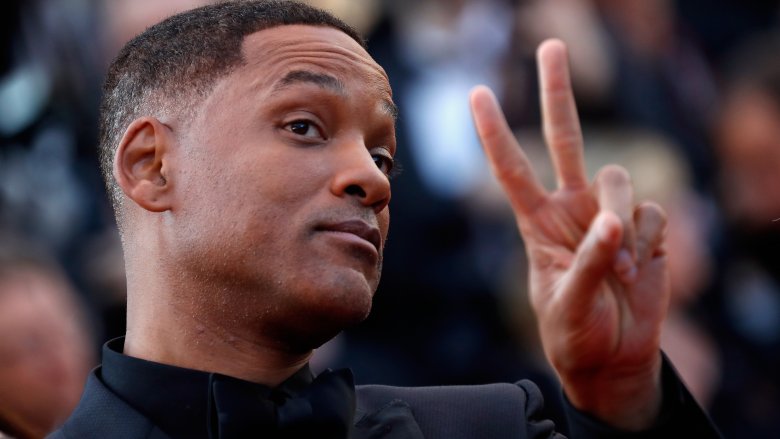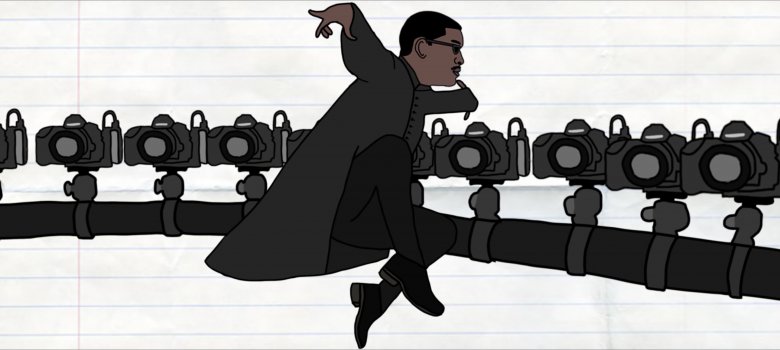How Will Smith Saved The Matrix
Before Will Smith headed straight to the Wild Wild West, he breezed right by The Matrix.
In a new video posted to his personal YouTube channel, Smith dropped a bombshell: he turned down the opportunity to star as Thomas A. Anderson (a.k.a. Neo), the computer programmer by day who moonlights as a genius hacker, in the famed sci-fi film The Matrix.
"This is one of them stories I'm not proud of, but it's the truth. I did turn down Neo in The Matrix," Smith began, urging viewers not to jump to conclusions before getting the full story and learning the circumstances that pushed him to reject the offer.
The actor rewound the clock to 1996 to tell the tale from the very beginning. That year, Smith was wrapping up the final season of The Fresh Prince of Bel-Air, the sitcom series that put him on the map and made him a household name, and was basking in the sweet waters of success following the release of Independence Day, Roland Emmerich's Academy Award-winning sci-fi actioner that remains one of the highest-grossing films in all of cinema history, in which Smith starred as Marine F/A-18 pilot Captain Steven Hiller. Smith was also experiencing continued recognition for his role as Detective Sergeant Marcus Burnett in 1995's Bad Boys, the buddy-cop action comedy that sparked a franchise that's still carrying on to this day.
It's little wonder why Lana and Lilly Wachowski, the writers and directors of The Matrix, and studio Warner Bros. wanted Smith to lead the film: he was gaining star power by the second and seemed virtually untouchable.
But Smith had clear-cut intentions for his career moving forward, not wanting to isolate himself to a certain kind of genre in apparent fear of being type-cast. This led him to initially turn down Men in Black two years prior to saying no to The Matrix.
"That was a crazy time in my life. It was, like, however I threw the ball, it was going in. I had done Independence Day the year before, so I was like, eh, I'm not doing another alien movie. I don't want to be the alien movie guy. So I turned down Men in Black, and Steven Spielberg called me. He was producing. He was like, 'Why are you turning down the movie?' I was like, 'You know, I just don't want to be the alien guy.' He said, 'Do me a favor. Don't use your brain for this one, use my brain,'" Smith explained.
He continued, adding that he took Spielberg's advice and eventually joined Men in Black as James Darrell Edwards III (a.k.a. Agent J) and felt on top of the world for a short while after the film's debut in July of 1997. "He was so serious that I was like, 'Alright, he did do Jaws.,'" said Smith. "You just get in that universal energy, and nothing can go wrong. But then the other side comes, and you can't do nothing right."
Smith then brought us up to 1998, post-Men in Black and pre-The Matrix, when he had some big decisions to make.
"So after we did Men in Black, the Wachowskis came in, and it was like they had only done one movie. They did a movie, I think it was called Bound," said Smith. [Author's note: Bound was indeed the Wachowskis' feature film directorial debut, though the sibling filmmakers did write the script for 1994's Assassins, which director Richard Donner later hired Brian Helgeland to completely rewrite.] "They came in and they made a pitch for The Matrix, and it turns out, they're geniuses."
Supreme storytelling skills and superior intellect aside, Smith shared that the Wachowski sisters' idea for The Matrix didn't strike his fancy. In fact, the Wachowskis' apparent laidback, stoner-like behavior and strange pitch completely confused Smith.
"There's a fine line in a pitch meeting between genius and what I experienced in the meeting. So this is the actual pitch that they made for The Matrix," said Smith, putting on California surfer-type accent to impersonate the Wachowskis, both trans women who are now credited as Lana and Lilly Wachowski. "So dude, we're thinking, like, like, imagine you're in a fight, and you, like, jump. Imagine if you could stop jumping in the middle of the jump ... But then people could see around you 360 [degrees] while you're jumping, while you're stopped jumping. And then we're gonna invent these cameras, and then people can see the whole jump while you stop in the middle of the jump."
The Wachowskis' pitch for The Matrix ultimately put Smith off the project. Instead, he made the steampunk Western action comedy Wild Wild West — a low point in Smith's professional life.
"I'm not proud of it," said Smith of the film, which bombed with critics and causal moviegoers so hard that its consensus reads like a bit from a roast of a celebrity: "Bombastic, manic, and largely laugh-free, Wild Wild West is a bizarre misfire in which greater care was lavished upon the special effects than on the script."
Still, Smith has no regrets about turning down The Matrix. The actor feels he actually did movie-lovers a great justice in rejecting the offer to play Neo, admitting that he likely would have screwed up The Matrix if he lead the film and not Keanu Reeves, the actor who accepted the role Smith walked away from. Smith explained that his hypothetical casting in The Matrix would have thrown the balance of the film off: if he was Neo, then Laurence Fishburne wouldn't have been cast as Morpheus, as the film's creative team apparently wanted one black actor and one white actor to star.
"Keanu was perfect. Laurence Fishburne was perfect. If I had done it, because I'm black, then Morpheus wouldn't have been black — they were looking at Val Kilmer," Smith stated. "I was gonna be Neo and Val Kilmer was gonna be Morpheus. I probably would've messed The Matrix up. I did y'all a favor!"
Considering Smith already experienced wariness at the thought of doing too many sci-fi action movies back-to-back and that he was evidently in a headspace that craved the camp, comedy, and nonsensicalness of Wild Wild West rather than the philosophical and spiritual elements of The Matrix, Smith may not have given the role of Neo the attention that it required. The actor was essentially prioritizing goofiness over anything else back in the late 1990s, and he very well could have taken a wildly different approach to Neo than did Reeves, resulting in a version of the character that may have felt affected and that was unable to hit all the right emotional beats. As many Matrix fans will agree, no one but the reserved, somewhat steely Reeves could play Neo perfectly.
Had Smith taken the role instead, the world wouldn't know Reeves as Neo (or Fishburne as Morpheus, for that matter). If he did turn in a half-baked performance, Smith could have been responsible for possibly sinking the film series before it spurred a pair of sequels. Several franchises have suffered a similar fate, and to think that Smith, one of the most diverse actors working in Hollywood today, might have stripped the masses of an enjoyable original Matrix movie and performances by Reeves and Fishburne, and potentially stopped the production of the follow-up films The Matrix Reloaded and The Matrix Revolutions is almost too much to bear.
At the end of it all, as much as everyone (Smith included) despised Wild Wild West, we're glad Smith chose to make it over taking the lead role in The Matrix. In a way, Smith stumbled in Wild Wild West so Reeves and Fishburne could soar in The Matrix — and that decision genuinely may have saved not just the first film but also the entire franchise.

